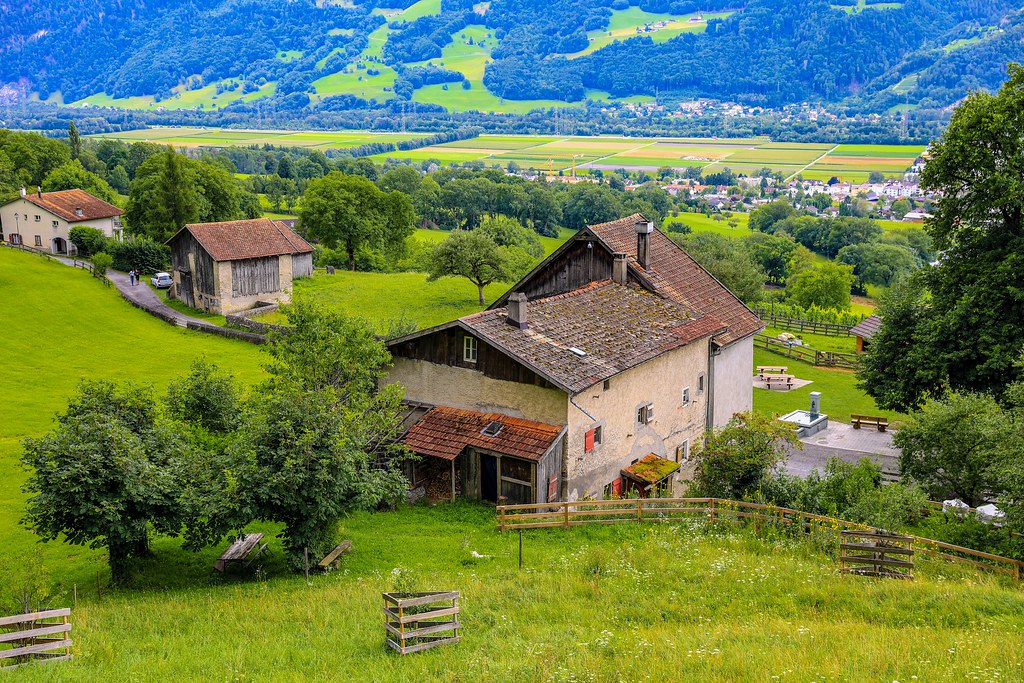Blog Post
Walking in Heidi’s footsteps
This is my first essay for a new site that recently launched, Utopian Idiots. To get an idea of what this platform seeks to do, give John Jalsevac’s introductory essay “Things Should Take A Long Time” a read–it’s worth the time.
We came upon Heididorf by accident, winding between the Swiss mountains on a drive from my meeting in Salzburg to another in Zug. My wife spotted the sign for Maienfeld first. Why was that name so familiar? Perhaps it was the landscape, with the Alpine peaks rushing skyward all around us, but it struck me suddenly: Heidi. Maienfeld was the village in Johanna Spyri’s 1881 Swiss classic, Heidi, which I must have read a half dozen times growing up. A few miles down the road, and another sign confirmed it—we were in Heidi’s country, a land forever defined by the love of a single little girl.
We swung off the highway into the village, a lovely collection of windy cobblestone streets, spires, and little shops that were just beginning to close up for the day. Rustic wooden signs pointed us up towards the mountains. We left the village and began to wind our way up the mountainside. We crossed meadows and passed farms settling in for the night, the cottage windows glowing a warm and welcoming gold in the dusk. Eventually, the narrow, winding road reached a plateau paved with asphalt, and a billboard in the corner informed us that the “original Heidi house” was a short hike up the mountain.
I hoisted our little daughter Charlotte onto my shoulders. She began pointing out the sights and chattering as we climbed up the path. The air was crisp and cold and alive. Somewhere in the village, a church bell pealed out clear and strong, echoing timelessly across the valley. At one and a half, Charlotte was too small to have heard the story of the dark-haired girl who moves into the home of her grandfather perched in the Alps, a story that was, as Spyri observed in her subtitle, for “children and those who love children,” but she was nonetheless fascinated by the sheep still grazing in the pasture. One of them let out a plaintive bleat, and Charlotte baaed enthusiastically in response. The sheep gazed back at her, briefly bewildered.
At the end of the path we found a simple white cottage with a brown wooden roof next to an enclosure of low stone walls. The pen was inhabited by a small herd of goats, who raised their jangling heads to peer at us, their neck bells swaying. Nearby was a little wooden sculpture of the immortal Heidi herself, clutching one of her pet goats, her scraggly hair tossed and tangled in the sharp mountain breezes. Charlotte promptly attempted to climb astride Heidi’s goat, shaking her own tousled hair out of her eyes as she clutched and grunted with effort. At Heididorf, Charlotte was right at home.
The cottage in the Alps; the sheep and the goats in the pasture; the air so cold and refreshing you could almost drink it—it made the story of Heidi a living thing. The mountains crowded around us like a cluster of cathedrals, and it seemed as if God put the peaks in place to point our eyes upwards and remind us of His presence. Heidi, who constantly reminded her friends to remember to pray, certainly felt it keenly. The beauty of Heidi’s story is much like that of other little heroines of literature, like Laura Ingalls Wilder and Anne of Green Gables: The simple things are placed firmly in the centre of life. Just a little girl and a little boy and wildflowers and goats and pure mountain air. This simple story has lasted over a century—right into the age of smartphones, when lives like Heidi’s have virtually vanished.
There is something about Spyri’s story that elicits nostalgia even in readers who have never experienced the sorts of things she describes. Heidi makes them long for them. Reading Heidi, we feel as she did when she returned to her grandfather’s mountain home after leaving to live as a companion for a sick girl in Frankfurt: “It was so lovely, Heidi stood with tears pouring down her cheeks, and thanked God for letting her come home to it again. She could find no words to express her feelings, but lingered until the light began to fade and then ran on.”
The excitement in Charlotte’s face as she frantically pointed at each new sight reminded me of how I felt when I first read the story. Years later, I found a copy of Heidi Grows Up, written after Spyri’s death by her French translator, Charles Tritten. It wasn’t a bad book, really, but the magic was gone. Was it because Heidi had, in fact, grown up, and that the innocence and pure simplicity of children on the mountain had vanished with their childhood? I remember thinking that it was a shame that Tritten hadn’t just left Heidi where she belonged, with Peter and her grandfather and her goats, instead of forcing her to age like the rest of us.
I thought, as I carried Charlotte on my shoulders down the darkening path and she rested her cheek on my head and heaved a contented sigh, that this was all going to be over too soon. That in a moment or two, she would grow up and the simple things would give way to the inevitable complexities of being older. And I was reminded of a few lines by Ezra Pound, which I think of often:
And the days are not full enough
And the nights are not full enough
And life slips by
Like a field mouse
Not shaking the grass

The cottage in the Alps; the sheep and the goats in the pasture; the air so cold and refreshing you could almost drink it—it made the story of Heidi a living thing. The mountains crowded around us like a cluster of cathedrals, and it seemed as if God put the peaks in place to point our eyes upwards and remind us of His presence. Heidi, who constantly reminded her friends to remember to pray, certainly felt it keenly. The beauty of Heidi’s story is much like that of other little heroines of literature, like Laura Ingalls Wilder and Anne of Green Gables: The simple things are placed firmly in the centre of life. Just a little girl and a little boy and wildflowers and goats and pure mountain air. This simple story has lasted over a century—right into the age of smartphones, when lives like Heidi’s have virtually vanished.
There is something about Spyri’s story that elicits nostalgia even in readers who have never experienced the sorts of things she describes. Heidi makes them long for them. Reading Heidi, we feel as she did when she returned to her grandfather’s mountain home after leaving to live as a companion for a sick girl in Frankfurt: “It was so lovely, Heidi stood with tears pouring down her cheeks, and thanked God for letting her come home to it again. She could find no words to express her feelings, but lingered until the light began to fade and then ran on.”
The excitement in Charlotte’s face as she frantically pointed at each new sight reminded me of how I felt when I first read the story. Years later, I found a copy of Heidi Grows Up, written after Spyri’s death by her French translator, Charles Tritten. It wasn’t a bad book, really, but the magic was gone. Was it because Heidi had, in fact, grown up, and that the innocence and pure simplicity of children on the mountain had vanished with their childhood? I remember thinking that it was a shame that Tritten hadn’t just left Heidi where she belonged, with Peter and her grandfather and her goats, instead of forcing her to age like the rest of us.
I thought, as I carried Charlotte on my shoulders down the darkening path and she rested her cheek on my head and heaved a contented sigh, that this was all going to be over too soon. That in a moment or two, she would grow up and the simple things would give way to the inevitable complexities of being older. And I was reminded of a few lines by Ezra Pound, which I think of often:
And the days are not full enough
And the nights are not full enough
And life slips by
Like a field mouse
Not shaking the grass









What a delightful article Jonathan. It’s good to remind ourselves that we are immersed in the beauty of God’s creation despite the darkness of the world around us that threatens to envelop us.
Thank you!
Heidi was and is my all time favorite childhood book! I have a copy that is illustrated beautifully given to me by my big brother when he returned from Germany (I was 5 or 6) my family is originally from Lucerne, Switzerland and I have been there but never thought to look for Heidi’s village! I now know I have to return and see it for myself! Thank you for such a wonderful reminder of a truly magical story of simplicity of heart and beauty of God’s creation and redemption (sadness of Heidi’s loss of her parents but the grace and mercy brought to all through her return to her grandfather) ! I never read “Heidi grows up”and won’t bother looking for it now!